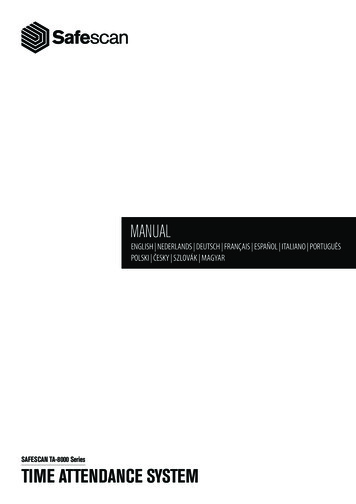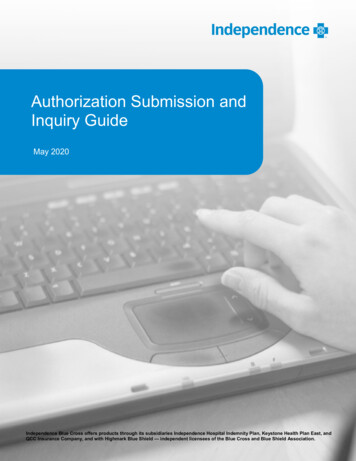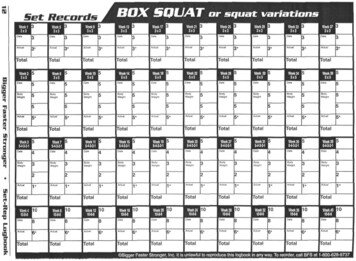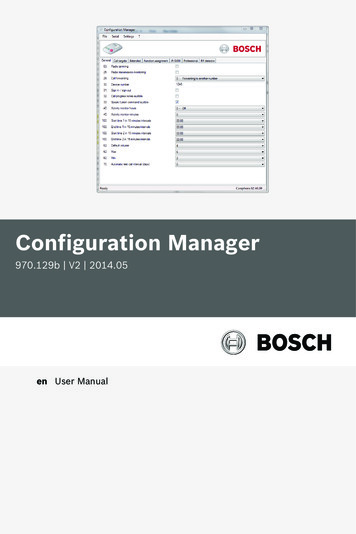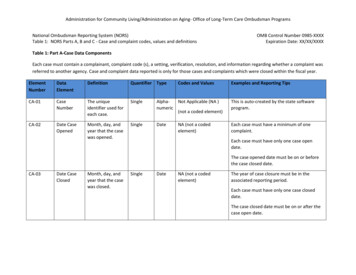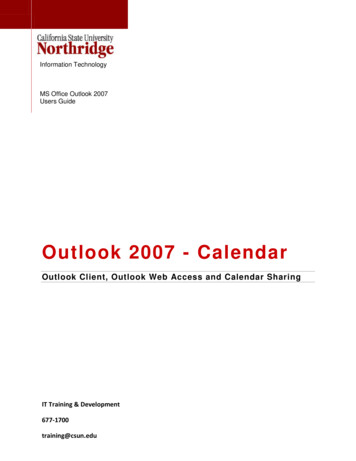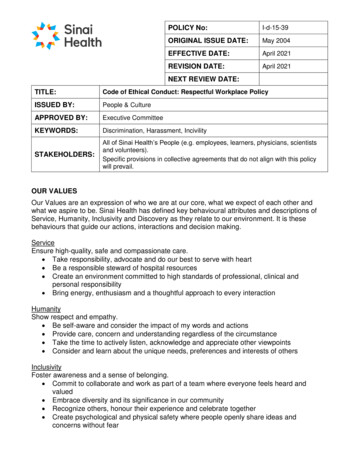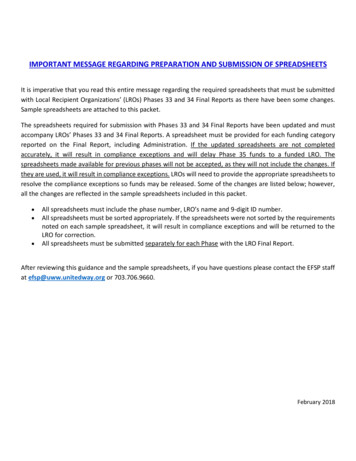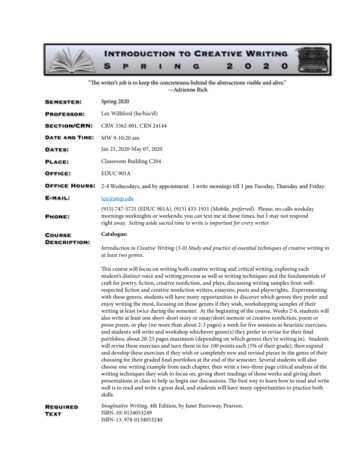
Transcription
“The writer’s job is to keep the concreteness behind the abstractions visible and alive.”—Adrienne RichSemester:Spring 2020Professor:Lex Williford (he/his/él)Section/CRN:CRW 3362-001, CRN 24144Date and Time:MW 9-10:20 amDates:Jan 21, 2020-May 07, 2020Place:Classroom Building C204Office:EDUC 901AOffice Hours: 2-4 Wednesdays, and by appointment. I write mornings till 1 pm Tuesday, Thursday and Friday.E-mail:lex@utep.eduPhone:(915) 747-5721 (EDUC 901A), (915) 433-1931 (Mobile, preferred). Please, no calls weekdaymornings weeknights or weekends; you can text me at those times, but I may not respondright away. Setting aside sacred time to write is important for every writer.CourseDescription:Catalogue:Introduction to Creative Writing (3-0) Study and practice of essential techniques of creative writing inat least two genres.This course will focus on writing both creative writing and critical writing, exploring eachstudent’s distinct voice and writing process as well as writing techniques and the fundamentals ofcraft for poetry, fiction, creative nonfiction, and plays, discussing writing samples from wellrespected fiction and creative nonfiction writers, essayists, poets and playwrights. Experimentingwith these genres, students will have many opportunities to discover which genres they prefer andenjoy writing the most, focusing on those genres if they wish, workshopping samples of theirwriting at least twice during the semester. At the beginning of the course, Weeks 2-6, students willalso write at least one short-short story or essay/short memoir or creative nonfiction, poem orprose poem, or play (no more than about 2-3 pages) a week for five sessions as heuristic exercises,and students will write and workshop whichever genre(s) they prefer to revise for their finalportfolios, about 20-25 pages maximum (depending on which genres they’re writing in). Studentswill revise these exercises and turn them in for 100 points each (5% of their grade), then expandand develop these exercises if they wish or completely new and revised pieces in the genre of theirchoosing for their graded final portfolios at the end of the semester. Several students will alsochoose one writing example from each chapter, then write a two-three page critical analysis of thewriting techniques they wish to focus on, giving short readings of those works and giving shortpresentations in class to help us begin our discussions. The best way to learn how to read and writewell is to read and write a great deal, and students will have many opportunities to practice bothskills.RequiredTextImaginative Writing, 4th Edition, by Janet Burroway, Pearson.ISBN-10: 0134053249ISBN-13: 978-0134053240
Lex WillifordSpring 2020Syllabus CRW 3362I had lunch with Janet Burroway at an Associated Writers and Writing Programs Conference in2016. Referring to her wonderful book, Writing Fiction: A Guide to Narrative Craft, I told her,“Your book’s too expensive,” and she said, “I know.” And she did something about it, took thebook to another press, a book that had been as high as 100 new in paperback (now only 14),almost the same price it was when I used it thirty years ago, less than the price it cost last year justto rent the same book.Unfortunately, for this class, Burroway didn’t do the same with her other wonderful book onwriting, the one I’m asking you to buy (or rent) this semester. I’m sorry. If I have lunch with Janetat the AWP Conference this March in San Antonio, I may have this conversation again, about thetext I’m asking you to buy (or rent). In the meantime, we have to make do. For the record: I don’tbelieve anyone should have to rent a book—an obscene idea—but these are the times we live in.Please buy the 4th edition only; that’s the edition with the poetry, fiction, creative nonfiction andplays we’ll Read for this semester. Earlier editions may be cheaper, but they won’t have the samereadings. The high-cost of reprint permissions to publish all these respected writings is the mainreason this book is so expensive—I know because I have to pay permissions for stories and essaysin my own anthologies with Simon & Schuster.CreativeWritingProgramCitizenshipOne of the great advantages for our creative writing program is that our students have manyopportunities to meet distinguished international writers during readings, Q & A, workshops,etc., so I encourage you to go to at least two readings this semester. One of these readings isrequired: Pulitzer Prize-Winning/U. S. Poet Laureate Tracy K. Smith’s Reading and Q &A onThursday, January 30 at 6:30-8 PM, in the Tomas Rivera Conference Center, UTEP UnionBuilding East Room 308. Please make plans now to be there. Readings can be life-changingevents for writers of every age.Plagiarism:Don’t eventhink aboutit.WHAT IS PLAGIARISM?Plagiarism means using another’s work without giving credit. You must put others’ words inquotation marks and cite your source(s) and must give citations when using others’ ideas,even if those ideas are paraphrased in your own words.“Avoiding Plagiarism”: https://www.utep.edu/student-affairs/osccr/ Files/docs/AvoidingPlagiarism.pdf The following are direct quotations from syllabi statements cited in “Example ClassroomMutualInclusion Strategies”:Respect,Diversity d Pronouns Diversity StatementUsage“I consider this classroom to be a place where you will be treated with respect, and I welcomeStatementsindividuals of all ages, backgrounds, beliefs, ethnicities, genders, gender identities, genderexpressions, national origins, religious affiliations, sexual orientations, abilities—and othervisible and non-visible differences. All members of this class are expected to contribute to arespectful, welcoming and inclusive environment for every other member of the class.”Safe Zone Statement“I am available to listen and support you in a safe and confidential manner . . . . I can help youconnect with resources on campus to address problems you may face that interfere with youracademic and social success on campus as it relates to issues surrounding sexual orientation andgender identity. My goal is to help you be successful and to maintain a safe and equitablecampus.”2.
Lex WillifordSpring 2020Syllabus CRW 3362Gender-Neutral and Non-Gendered Pronouns“I will gladly honor your request to address you by an alternate name or gender pronoun. Pleaseadvise me of this preference early in the semester so that I may make appropriate changes to myrecords.”If you openly self-identify by a name not listed in UTEP’s records or by your own distinctivechoice of gender-neutral or non-gendered pronouns, you may use the option in this class toeducate your classmates and me in the evolving conventions now recommended to ensure thatall students’ diverse identities are treated with respect.Of course, you have the right to keep your self-identification confidential but if you wish toidentify yourself more accurately, one way to instruct the class is to create a tent card for thedesk where you sit with your preferred name and/or non-gendered pronouns (the singular they/them/their or ze/zir/zirs, etc.). A Google search will help any student curious enough to find outmore may learn these pronoun conventions. All these suggestions are optional, of course.Grades:Assignments One 1-2 page critical analysis of a story, poem, essay or play in Writing Fiction: On the first day of class students will sign up throughout the semester—choosingyour favorite reading assignment in each chapter the week you’ve signed up towrite about, then giving an oral presentation of your critical analyses in class. Please don’t e-mail me this assignment or give me a hard copy in class. Upload theassignment to the appropriate assignment in Blackboard. Please turn your papers inno later than two weeks after you present them to class. Before you write your critical analysis, be sure to read my guide to writingcritical analysis at the end of this syllabus. I’m quite specific about what I’mrequesting, so faking it probably won’t work. Writers will practice both creativeand critical writing to discuss technique with specific textual examples andoriginal and insightful interpretations.5% Five Revised 2-3 pp. Short 15-Minute Exercises in Any Preferred Genre: Some of these may begin as in-class heuristic exercises, based upon prompts Imay give in class, for workshop discussion in the first five weeks, intendedprimarily to help you generate new material. You’ll upload drafts for workshopunder Blackboard: Upload Here: Ungraded Writing Assignments (For ScheduledWorkshop Discussions Each Week Only). After we read and discuss these in class, you’ll revise and turn them in for agrade a week later. Upload your revisions of these exercises to Blackboard:Upload Here: Graded Writing Assignments (Final Drafts), and you’ll receive anautomatic 100 for each exercise—an excellent way to give your final grade a littlebump. Don’t forget to upload these final drafts of your exercises to Blackboard nolater than two weeks after we workshop them. Better to receive a 100 than a 0, right? See Instructions for All Exercises for Workshop Discussion in Week 1 for moreinformation. If students don’t like or if they find our in-class writing exercises completelygoofy and uninspiring, they may use instead any of the Try This writing promptsin Imaginative Writing on any these pages: 24, 25, 38, 39, 43, 45, 46, 49, 52, 53, 54,58, 60, 60, 61, 68, 82, 93, 97, 99, 102, 85, 86, 87, 93, 94, 97, 99, 102, 105, 106, 108,127, 130, 134, 138, 139, 141, 142, 146, 148, 150, 152, 154, 157, 158, 168, 171, 172,175, 181, 186, 187, 188, 190, 194, 199, 200, 203, 204, 205, 206, 208, 218, 223, 227,228-9, 233, 236, 237, 245, 247, 251, 255, 262-3, 265, 267, 268, 280, 302-3, 304,305, 315, 316, 317, 318, 321, 324, 325, 326, 338-9, 356, 362, 374, 375, 376, 377and 382.5%3.
Lex WillifordSpring 2020 Class Participation Grade: Adobe Acrobat comments count: I’ll ask that each of you keep a regular tallyof the numbers of comments you’ve made for each workshop and to record thatnumber in your Final Portfolio Cover Sheet at the end of the semester. If youwish you may give me a weekly average of those comments instead. Irecommend that you make at least five textual comments in each other’sworkshop stories and that you leave a specific 1-2 paragraph note at the end ofeach story we workshop. In-class Participation: I’ll ask that you show up to class on time andcontribute to the in-class course discussions as much as possible. Summary ofWorkshopDeadlinesSyllabus CRW 3362Final Portfolio: Your choice of a combination of well-crafted short-shorts/flashfiction, short stories and/or novel chapters we’ve workshopped in class, a minimumof 25 pages or so—quality, not quantity, being the most important criterion. Please 80%upload this assignment to Blackboard. Please don’t e-mail me this portfolio or giveme a hard copy in class. I grade final portfolios directly from Blackboard.Upload to Dropbox Link here (or to theSame Links in Blackboard) theseWorkshop Assignments: In-Class Exercise 1 for Week 2 workshop In-Class Exercise 2 for Week 3 workshop Summary st/JTmQZekCw9m263V1Uk8RIn-Class Exercise 5 for Week 6 workshop pOIn-Class Exercise 4 for Week 5 workshop C6In-Class Exercise 3 for Week 4 workshop AlIndividual Story, Creative Nonfiction Essay, Poems(3) or Drama Workshops (two slots below signed upfor, one before and one after mid-semester). Youdecide the genres you wish to write in, and we’llworkshop everyone’s work if we have time.Upload to Blackboard theseGraded Assignments: 10%In-Class Exercise Final Revision 1WeekDUE:Date Due(MidnightThursday):1January 302345February 6February 13February 20February 277-15See daily schedule below.WeekDUE:Date Due(MidnightThursday):3February 6 In-Class Exercise Final Revision 24February 13 In-Class Exercise Final Revision 35February 20 In-Class Exercise Final Revision 46February 27 In-Class Exercise Final Revision 57March 54.
Lex WillifordSpring 2020Syllabus CRW 3362Thursday, Short Critical Analysis (2-3 pp. max.) Final Portfoliothe weekafter youpresent16See assigned poetry, fiction,nonfiction and dramadiscussion sign ups below.Due no later than midnightthe Thursday two weeksafter you present youranalysis to class.Friday, May 8If you haven’t got the latest version of the free Adobe Acrobat Reader, please download andinstall it now from http://get.adobe.com/reader. (The most recent version of Adobe AcrobatReader works best, so please update or upgrade the previous version.)Adobe AcrobatWeekly SharedCommentsDeadlines:Shared Reviews in Adobe Acrobat Reader allow students to share their comments throughthe Adobe Creative Cloud (linked to weekly Dropbox folders from this syllabus and fromthe same ungraded workshop Dropbox document links in Blackboard), making it possiblefor students to make comments, publish them online and read other students’ comments,constantly syncing everyone’s comments in the the cloud. Adobe also makes line-by-lineediting, correction and commenting available to every student. I often make line edits withmy iPad Pro, to help you learn a few editing techniques.Please note: If you have a workshop and want to have a copy of other students’ commentson your workshop documents, please download the file directly from Adobe. Adocument’s available to view on your computer, tablet and even your smart phone, butyou must download them if you want to keep a copy of comments on your own work.Here are the steps we’ll follow for workshops using Adobe Acrobat Reader: After your write your workshop documents—in Word or Rich Text Form—please exportthem to Adobe Acrobat format if possible and copy them to the appropriate weeklyDropbox link listed in this syllabus or in your weekly Blackboard workshops folder[Ungraded Writing Assignments (Only for Workshop Discussions Each Week)]. I’lldownload all the submitted documents for each week’s scheduled workshops, combinethem into a single Acrobat document, enable them for comments and e-mail a link to thedocument on Fridays to every student in class for their comments. Notes on Workshop Comments in Adobe Acrobat: Please use only the margins for your comments. Please use the Sticky Note tool for comments, and avoid using the Call-Out/TextBox tool, which tends to cover up the document so it’s difficult for others to read,move or delete the text box. Avoid editing too much since others will not be able to edit the same passages,too. Acrobat allows you to comment not only on Windows or Mac computers but alsoon your smartphones or tablets, usually through your web browser, though youmay open the documents directly in Adobe Reader DC on your computers. Adobe can be glitchy, so I can’t guarantee that I can make everyone’s—or even my—comments appear in workshop discussions. If you have questions, ask in class or click on this a direct link to an updated YouTubevideo: https://youtu.be/29rwOm-9D2E. You may also view this same short presentationon Blackboard.WorkshopDiscussions:Hybrid Courses: We’ll conduct most of our discussions in class based upon the AdobeAcrobat comments class members have already made. I’ll project these comments onto anoverhead screen so that we can read and discuss them in class.Important:For workshops, I’d rather receive unfinished work than late work.5.
Lex WillifordSpring 2020Syllabus CRW 3362Please don’t wait until the last minute to meet your workshop deadlines. If you’re unable tocomplete a story, flash fiction or novel chapters, turn in what you’ve written so far. If you mustmiss class the week your stories and/or chapters are up for discussion, please let me knowimmediately so we can arrange to workshop other students’ work. Our schedule will be tight andyou’ll need to keep track of deadlines throughout the semester.Please write concrete, helpful comments for your fellow writers, based upon technique ratherthan vague, subjective judgments. If you write, “Cool, dude,” or “I like/don’t like this idea/scene/treatment/story,” you’re not helping other students. If you find a problem with a story,please offer a specific, helpful suggestion or two to get the writer on track. You’d want the samefor your work.It’s okay to say you like something; you just need to say why, as concretely as you can, recognizingthat saying, This does/doesn’t work should also include for me. It’s probably best not to say you don’tlike something in any case—that’s a subjective comment that often doesn’t help and ends upcreating conflict, something we want on the page and not in class. Focus on mostly craft,authenticity, credibility and technique. One of the most important things you can tell a writer isthis: “I don’t believe this character/line of dialogue/action/scene.” Just be sure to say why or whynot—especially how to make what’s inauthentic or unbelievable work a bit better for you.Weekly Schedule and DeadlinesFriday-Sunday Monday &Wednesday Thursday FridayComplete your comments on workshop documents for workshops in the upcoming week.Workshop documents.Please upload all drafts of your workshop documents to their Dropbox links in this syllabus orBlackboard no later than midnight Thursday the week before they’re scheduled for workshop.Please upload all final drafts of graded assignments to Blackboard no later than midnightThursday at the designated deadlines throughout the semester listed on page three of thissyllabus.Fridays, I’ll e-mail everyone links to a shared PDF document enabled for comments fordiscussion on for classes in the upcoming week. If you’ve not turned in your workshopdocuments by the deadline, we won’t workshop your exercises or stories. Please make all yourcomments on the documents before our Monday workshop if possible. I’ll set commentsdeadlines about a week ahead to give you plenty of time to make comments. Throughout thesemester please keep a running tally of how many comments you make each week.Daily ScheduleWeekDateI’ve listed the assignments below by week rather than by a clearly delineated Monday/Wednesday schedule. Please finish the listed readings by Monday of each week. We’ll beginworkshops on Mondays, so please make comments on as many of the stories up for workshop as youcan before Monday’s class. Also, please look at least two or three weeks ahead to meet importantdeadlines, listed in the syllabus (p. 3). I may forget to tell you what you need to do for thefollowing week in class, so when in doubt refer to this syllabus.Monday, No Class:Martin Luther King, Jr. HolidayWednesday6.
Lex WillifordSpring 2020 Week 1Wednesday only,January 22 Syllabus CRW 3362Blackboard Weekly Exercise Deadlines (Weeks 2-6)Please refer to the Summary of Workshop Deadlines and Summary of BlackboardDeadlines on p. 3 of this syllabus for the deadlines for exercises for workshop and exerciserevisions for the first six weeks of class.Instructions for Exercises for Workshop Discussions the next six weeks:In fifteen minutes, writea short-short story (flash fiction), poem, prose poem, essay or play based upon prompts I give in class.a piece of (pick a genre above) inspired by our readings, or a piece of (pick a genre above) based upon new stories or novel chapters you'd like to begin as part of projects you're working on, ora dramatic scene you'd like to write as part of projects you're working on. Spend two hours revising this short piece.Upload the exercise to Week #: Exercise # no later than Thursday midnight the week beforeworkshops.For the first six weeks, I’ll download all these exercises Friday, combine, convert and enablethem for Adobe Acrobat comments and e-mail a link to the documents to everyone in classfor their comments.I may ask each of you to read your exercise aloud in class or, if you're shy, I'll read them foryou.I'll ask that students read each others’ short pieces and leave a short comment (a paragraphor two) at the end of each to help the writer develop, edit and revise the piece.After workshop, please revise this piece and upload it by the posted deadline to the correctweek number listed in the Blackboard folder, Upload Revised Exercises Here: Weeks 3-7.When you upload the exercise for a grade, you'll receive a 100 for the effort. That’s 5% ofyour grade for five exercises you've written and rewritten to get you started on new stories.These exercises are heuristic, meant to give you the incentive to take risks as you discoverand explore new stories and story ideas. (If you discover something new and exciting towrite about, terrific. If you don't, you've not risked more than a few hours of your time andcan move on to new stories or story ideas.)Please note: These and other workshop assignments do not appear in the Grading Centerand will not count as a part of your grade, except as Graded Assignments when you revise,rewrite and upload assignments for a grade.If you don't turn in stories to workshop by the deadlines designated in the syllabus, we'll notdiscuss your work in class.If you can't finish your work by the deadlines, send your work, unfinished, for workshopand we'll discuss as much as we can, and if you've been stuck might help you becomeunstuck.Please note that all submissions uploaded to Blackboard, graded or ungraded, are checkedfor plagiarism using SafeAssign.Don’t want to write from my prompts or revise the short-short you’ve written in class? Feelfree to use any of the writing prompts throughout IW to write an exercise you like better:pp. 20-21, 42-43, 73-74, 99-100, 122-23, 151-52, 178-79, 200, 222-23.Agenda: Introduction to the Class7.
Lex WillifordSpring 2020 Syllabus CRW 3362Sign Ups:At the beginning of the first class day, I’ll pass around a hard copy of this syllabus’s sign-upslots for students to fill in. When the syllabus comes to you, please fill in all the slotsdescribed in 1-3 below. We’ll flip a coin to see who starts syllabus sign ups.1. Please sign up for one critical analysis slot for one of your favoritestories, poems, essays, plays, etc. listed for the week you’ve signedup for. If three people all choose the same piece, those peoplewill still present their analyses. Each reading is as individual anddistinct as each writer in class.2. Please sign up for two workshop slots below, one from Weeks7-11, and one from weeks 11-15.3. Please fill in the missing student contact information on page 24.If you prefer a nicknames or shorter name, please write that in.If you want to keep any of this information confidential, noproblem. Just leave the slots blank. Week 1Wednesday only,January 22This Syllabus, Class Assignments Please review in your free time: My Short Presentation on Using Adobe Acrobat Commenting Tools: Navigation in Blackboard: Home This syllabus Upload Here: Ungraded Writing Assignments (Only for ScheduledWorkshop Discussions Each Week) CRW 3371 Deadlines Calendar Workshop Cover Sheet Weeks 2-6: Upload Your Exercises Here for Workshop. Weeks 7-15: Upload Your Two Scheduled Workshop DocumentsHere. Upload Here: Graded Writing Assignments (Final Drafts) CRW 3371 Deadlines Calendar Weeks 3-7: Upload the Revised Drafts of Your Exercises Here for aGrade. Critical Analysis presented in class: A Story from Burroway'sWriting Fiction Final Portfolio Publishing SupplementsRead for Week 2 CHAPTER 1 Invitation to the Writer 1 You. 1 and writing . . . 2 . . . and reading . . . 3 . . . and this book . . . 4 . . . and your journal . . . 6 Journal Excerpts 8 Ayelet Waldman 8 Billy Collins 9 Cris Mazza 9 Patricia Henley 10 Philip Graham 10 A word about your workshop . . . 128.
Lex WillifordSpring 2020Syllabus CRW 3362Blackboard Weekly Exercise Deadlines (Weeks 2-6) Please refer to the Summary of Workshop Deadlines and Summary of BlackboardDeadlines on p. 2-3 of this syllabus for the deadlines for exercises to workshop and revise fora grade.AgendaDiscuss Chapter 1; discuss journal entries; then read and workshop exercises.The Writer’s Brain: The myth and reality of the left and right hemispheres. The corpus callosum: The Negotiator. The limbic system: The Seat of Emotion Brain Evolution (Carl Sagan’s The Dragons of Eden.): “The mammalian” and “reptilian”complex. Broca’s Area: Specializes in language production.Week 2January 27 & 29 The frontal cortex: “Emotional regulation, gratification postponement, executive decisionmaking, long-term planning.”Discovering Stories: Creating and Revising Maps of Stories as You Write: E. L. Doctorow: “Writing is like driving at night in the fog. You can only see as far as yourheadlights, but you can make the whole trip that way.” (http://www.goodreads.com/author/quotes/12584.E L Doctorow) Mind Maps: Discovering structure as you write. Freewriting and Clustering: Gabriel Rico’s Writing the Natural Way.9.
Lex WillifordSpring 2020 Week 2January 27 & 29 Syllabus CRW 3362Writing as Gift (not a commodity): Lewis Hyde’s The Gift: Gift and commodity cultures. The muse’s gift, which we keep moving forward. It’s not a gift if we hold on to it. We can’t take credit for it, and when we do—when we write too much from the ego—themuse may abandon us. “Why do you write every day?” Cynthia Ozick: “What if the angel came and I wasn’tthere?Negative Capability: How Well Do You Live with Uncertainty and Ambiguity? John Keats (“Ode on a Grecian Urn”): “When a man is capable of being in uncertainties, mysteries, doubts, without anyirritable reaching after fact and reason” (http://en.wikipedia.org/wiki/Negative capability#Keats: The poet.27s turn of phrase) Roberto Unger: “The denial of whatever in our contexts delivers us over to a fixed scheme of divisionand hierarchy and to an enforced choice between routine and rebellion. It is thusthrough negative capability that we can further empower ourselves against social andinstitutional constraints, and loosen the bonds that entrap us in a certain socialstation.” https://en.wikipedia.org/wiki/Negative capabilityThe Ability to Live with Uncertainty: The writer must not just be able to live with uncertainty but also to thrive on it, especiallywhen it comes to issues of: Composition and Structure: Linear composition/Linear Stories. Nonlinear composition/Linear Stories. Linear composition/Nonlinear Stories. Can you answer the question, “I’m a composer/writer of stories”?The Reader’s Brain: The reader won’t read unless the outcome is uncertain; in fact, a reader will put a bookdown if the outcome is predictable. Stay one step or more in front of the reader. Janet Burroway: “Only trouble is interesting.” How does fiction work in the readers’ brain? A “neural confusion about the literal versus the metaphorical gives symbolsenormous power, including the power to make peace.” his-is-your-brain-on-metaphors/? r 0)And war. The Amateur and the Professional Writer: The “amateur” writer: Writing is private and therapeutic Writes to feel emotion. How do I unburden myself of this obsession, emotion? The “professional” writer: Writing is public—made public in publication--a craft Writes to earn emotion in the reader. How do I earn the reader’s emotion—that spontaneous feeling when I wrotea first draft?The Importance of Play and Work: Children naturally tell stories. Stories are what their play is all about. The critical boss/parental voice: No, you can’t do that. That’s not good enough Play and make a big mess (Write a shitty first draft,” writes Ann Lamotte); then clean upyour room.What kinds of stories do you prefer to read and write? Write what you know? Do you prefer writing what you don’t know? Do you come from an oral story-telling tradition? Who told the stories in your families? Were they good story tellers? Why? Recount a family story passed down through the generations.10.
Lex WillifordSpring 2020Syllabus CRW 3362Read for Week 3Week 2January 27 & 29 PART I The Elements of Craft CHAPTER 2 Image 15 Image and Imagination 16 Concrete, Significant Details 20 Figures of Speech 24 READINGS 28 Creative Nonfiction 28 Annie Dillard from Heaven and Earth in Jest 28 David Sedaris Standing By 29 Fiction 34 Tobias Wolff Bullet in the Brain 34 Jamaica Kincaid Girl 38 Poems 39 Roger Bonair-Agard American History looks for light—a prayer for the survival of BarackObama 39 Billy Collins Snow Day 41 Yusef Komunyakaa Facing It 42 Drama 44 Jane Martin French Fries 44Blackboard Weekly Exercise Deadlines (Weeks 2-6) Please refer to the Summary of Workshop Deadlines and Summary of BlackboardDeadlines on p. 2-3 of this syllabus for the deadlines for exercises to workshop and revise fora grade.Agenda WEEK 3Discuss Chapter 2, stories, poems, essays and plays; then workshop exercises.Quotations “A writer is a person upon whom nothing is lost.”—Henry JamesFebruary 3 & 5 Poetry isn’t about emotion. It’s about [recreating] the experience of emotion.—John Ciardi Clichés Don’t bore me with the details. The devil’s in the details. “God’s in the details.”—Ludwig Mies van der RoheWriting with abstractions makes it less likely make readers feel or experience thoseabstractions. “I feel like . . .” What’s an abstraction?11.
Lex WillifordSpring 2020 Syllabus CRW 3362What’s value judgment adjective (the dreaded VJA)?What’s an adverb? A VJA with an “ly” ending.What’s a concrete image?What’s a metaphor and simile? Vehicle (image) and Tenor (abstraction). Why do fiction writers use metaphors? Because they’re better than value judgments and abstractions, Because they “earn” the audience’s emotions. Recreating (or inventing) events to recreate (create) emotion.The rule “Show. Don’t tell” is misleadin
"!e writer's job is to keep the concreteness behind the abstractions visible and alive." —Adrienne Rich Semester: Spring 2020 Professor: Lex Williford (he/his/él) Section/CRN: CRW 3362-001, CRN 24144 Date and Time: MW 9-10:20 am Dates: Jan 21, 2020-May 07, 2020 Place: Classroom Building C204 Office: EDUC 901A Office Hours: 2-4 Wednesdays, and by appointment.
